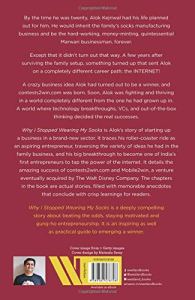Though I keep reading books, I have never written a review.
I recently read “Why I stopped wearing my socks” by Alok Kejriwal.
I also had a thought of writing a review and here it is.
First about the author, as given in the book.
Born and brought up in Mumbai, Alok Kejriwal is India’s serial digital entrepreneur and currently heading Games2win.
His first two companies contests2win and Mobile2win pioneered digital gaming and promotions in the world.
Mobile2win was later acquired by the WaltDisney Co.
Besides being a businessperson, Alok is also a passionate speaker and a mentor for emerging entrepreneurs.
Alok has spoken at over one hundred conferences including at venues such as the Wharton and Harvard Business Schools and many of the IIMs and IITs.
Please goto https://therodinhoods.com/ to read more on Alok, his writings…

Now about the book
The book starts with him completing 10th grade and asked to go and help his grandfather in his trucking business.
There started his career in business and hitting on spot with his grandfather asking to expand the business and finding opportunity in ODC consignments.
His experience in working with officers in Mumbai docks are interesting.
His grandparents’ love and affection and their influence in his life from childhood and his deep faith in the almighty and gurus and their direction in his life and career has come out well in this book.
Then, for sometime he goes on trying his hands on LOC and Bill discounting, supplying leak-proof drums to a chemical company, starting ‘Solver’ for IPO subscribers and trading / investing in stock market.
Then, moving on to work in his father’s socks factory became a long duration stint in his career.
There he started learning the business, and his achievements was to come up with a detailed cost analysis which helped the company.
Untiring efforts to get potential buyers and finally cracking business with an European company which is a key start for their exports.
How being honest and open with a client has cemented him as a good businessman comes out very well in “Being Truthful is Being Profitable”.
The experience of being over-confident to accept a deal – very big risk – and how the team achieved on delivery
How does it feel like when you are called a liar? – He heard this twice on his face in his life.
After moving out of his father’s socks business, he had tried making a few attempts on an online ventures – and dropped those ideas
Finally, he lands up in online venture contets2win, followed by Mobile2win and Games2win
His experiences in Sales and Marketing – patience, persistence and perseverance is monumental – very much a trait for entrepreneurs – well explained
Few times you don’t know as an entrepreneur how much to charge a customer for a product or service
Few times you underestimate your business’ potential – to an extent of throwing 1/1000th of a number to a client 🙂
At times when a deal does not go through as expected – it may be for a better reason which you will know only in hindsight – so don’t burn your heart out
How do startup funding work? How VCs work? What do they expect from startup founders? How objective they are… What they can do to the startup business… How easy or tough they can be etc., etc., etc.,
How to balance startup days and time with family – what you may miss – how to evaluate which one to skip and which one to give importance to – may be you just need to ask your business stakeholder to help postpone the meeting – so you can balance both?
Post dot com crash – how difficult it was to run a dot com startup, when funding dried up, what were their efforts to raise funds which they could not – what advice they got – what helped them to find a solution – brilliant!
Fired out of the own company – how good it was in hindsight – Providence?
It is very surprising and interesting to see two Steve Jobs moments happened in his life – Fired out of his own company and one of his business acquired by Walt Disney 🙂
A few learning from his experiences – a lot more in the book at the end of every chapter:
– Strategically doing nothing is doing something too
– Bad times never last. Honest people always do
– Being over-confident is the best way to self-destruct
– A single act of greed could kill
– Procrastination kills, just get up, get out, and get started
– Just keep doing good work and angels will come blessing
– Whatever happens, happens for good
Overall, a very good book, easy to read, just flows like a river page after page, you cannot put it down. Must read for startup founders, aspiring entrepreneurs, and a good read for anyone who is interested in knowing how startups work and hard and soft skills can be put to work.
Great work Alok sharing experiences with all, and also continuing to write, speak and mentoring others !






You must be logged in to post a comment.